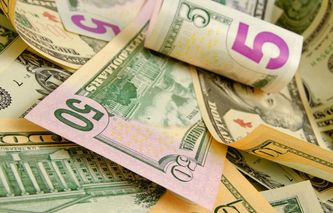Interest rates and inflation are intrinsically linked, and it’s all too easy for both to spiral out of control if they’re not kept in check. Find out more about the relationship between the two, and how both can impact your savings, your mortgage, and your pension.
What Are Interest Rates?
An interest rate is the amount of money a lender charges someone for borrowing money. It’s calculated as a percentage of the amount loaned, and when the loan is paid back, the interest is also due on the amount, increasing the total amount paid.
Interest rates on savings accounts follow the same principle. Banks and financial institutions that pay interest on savings use the deposited funds in their accounts to lend to other customers, so technically, they’re borrowing money from you. For the privilege, they’ll pay interest on these loans at the agreed interest rate.
What Is Inflation?
Inflation is the rate at which prices increase over a given period of time. This means the same amount of money won’t be able to buy as much as it used to, as regularly purchased items cost more.
Typically, inflation is given as a base rate, which covers the average overall increase of prices in a country.
What Makes Inflation Rise and Fall?
Inflation is influenced by the relationship between the demand and supply of goods and services. Prices rise when the demand for goods increases quicker than the supply of them because they become harder to get hold of.
This can be caused by a variety of factors, but the primary ones are:
Supply shocks that make certain goods harder to manufacture
More money in people’s pockets, increasing their desire to spend
For example:
During the COVID-19 pandemic, the demand for fuel went down because people were travelling less.
As a result, the price of oil dropped and petrol became cheaper, which is why the UK inflation rate fell in May 2020.
In contrast, the war in Ukraine caused disruptions in the global food supply chain, particularly affecting the price of wheat and grains.
This is why shortly after the Ukraine war began, the price of bread and cereals increased a lot, fuelling an inflation rate rise.
How Do Interest Rates Affect Inflation?
Central banks, like the Bank of England, the US Federal Reserve, and the European Central Bank, use interest rates as a means of controlling inflation. One of the key theories behind reducing inflation is reducing spending power, thereby slowing economic growth.
To reduce national spending power, central banks will often increase the base rate of interest to make borrowing more expensive. This reduces the capacity for spending on both an individual and national level, as both governmental borrowing to fuel public spending, and domestic borrowing for loans and mortgages become more expensive.
High interest rates are good news for savers, though, as the interest paid on your savings will likely increase in line with the base interest rate. In fact, in July 2023, the FCA challenged banks to speed up savers’ interest rate rises to better reflect the base rate of interest, threatening penalties if rates weren’t sufficiently passed on to consumers.
Problems With Using Interest Rates To Control Inflation
High interest rates make saving more lucrative and borrowing more expensive. Essentially, people are more likely to save, less likely to spend, and much less likely to borrow.
This creates some issues on the national level, as governments looking to invest in the country’s infrastructure usually need to borrow money, and these loans are more expensive to pay back when interest rates are high.
Squeezing personal expenditure through high interest rates also impacts nationwide growth. If people are buying things less frequently, businesses receive less money, which in turn means there is less money to fund wage increases, leading to a vicious cycle.
All of these scenarios mean the government is paid less in tax and businesses have less spare money to grow, causing overall growth in the country to stall.
How Does Inflation Affect My Savings?
Inflation can cause some problems for long-term savings, as it will mean the spending power of your money reduces over time, even if interest rates rise. Essentially, if things cost more, you won’t be able to buy as many of them with the same amount of money.
To give you a direct example, we’ve compared interest rates from 2002 to 2022 with the cost of a pint of milk.
Pint of milk | |
|---|---|
Year | Price* |
2002 - December | 37.0p |
2012 - December | 46.0p |
2022 - December | 69.0p |
*Data derived from the ONS.
Here’s what would have happened if you’d started saving the price of a pint of milk back in 2002, based on the average interest rate on UK savings accounts.
Interest | |
|---|---|
Year | Savings |
2002 - December | 37.0p |
2012 - December | 38.7p |
2022 - December | 39.4p |
As demonstrated, even though your savings would have increased through interest, the spending power of your savings will have almost halved.
It’s important to keep inflation in mind when deciding how you’d like to save for the future. Interest rates very rarely beat inflation, but in the long term, investments can provide better returns.
Can any savings accounts beat inflation?
Savings accounts can beat inflation, but it’s very rare, and it usually hits the headlines when they do. It’s worth remembering that unless your interest rate is higher than inflation, the spending power of your money will diminish over time.
Can Interest Rates Be Negative?
Interest rates can be negative, and some countries have negative interest rates currently. Negative interest rates are usually set by central banks and other regulatory bodies to regulate deflation.
Why Would a Central Bank Set a Negative Interest Rate?
Negative interest rates are usually implemented to control deflation and stimulate the economy. They encourage spending as there are fewer incentives for holding your money in a savings account.
This also encourages borrowing, as financial firms are more likely to charge lower interest rates on loans to customers. This money can then be more easily spent on goods and services, helping to boost the economy and restimulate inflation.
How Would a Negative Interest Rate Affect Me?
A negative base rate of interest wouldn’t necessarily mean you would be charged by your bank for looking after your money. In countries where the central bank has set a negative interest rate, people can typically still keep money in their bank account and not be charged.
Borrowing also becomes cheaper when the base rate of interest is negative, so things like loans and mortgages would be cheaper to pay off. However, interest paid on a loan would still most likely be above zero.
Can Inflation Be Negative?
Yes, negative inflation or ‘deflation’ happens when overall prices fall throughout the country. This is usually because the supply of goods and services is higher than the demand for them, but can also occur when the general buying power of money has increased.
Essentially, when goods are easily accessible from multiple places, businesses have to cut prices to remain competitive and encourage consumers to buy their products over the competition.
When deflation occurs, central banks often reduce interest rates to encourage spending and investment in the economy. This is important, as during a period of deflation, people often hold off on spending for longer in the hope that prices will have further decreased by tomorrow, which fuels deflation and causes prices to sink lower.
Which Is Worse, Inflation or Deflation?
Deflation seems pretty good from a consumer’s point of view, particularly when inflation and interest rates have been high. But it can be very dangerous economically.
Deflation often leads to unemployment, as businesses make less money on their produce and are forced to make cuts and occasionally downsize, meaning vast swathes of franchises close shops, factories, and warehouses to save money. This results in lots of workers being forced to find alternative employment.
As this is a nationwide problem, there are soon far fewer jobs available on the market, causing unemployment to rise and the government spending needed to support the unemployed to increase.
For this reason, most central banks aim to keep inflation rising at a low level, allowing businesses to grow, pay higher wages, and fuel the economy for more productivity and investment.
How Is Inflation Measured?
Inflation is commonly measured by comparing the cost of things today with how much they cost a year ago. The difference between these costs is calculated as a percentage and known as the rate of inflation.
For example:
The average loaf of bread cost £1.15 in 2022.
In 2023, the price of bread had risen to £1.35.
£1.35 - £1.15 = 0.2
0.2 / 1.15 = 0.174
0.174 x 100 = 17.4%
In 2023, a loaf of bread cost 17.4% more than it did in 2022. Therefore, the rate of inflation of a loaf of bread in 2023 was 17.4%.
While this is a very specific example, measuring inflation nationally is more complex. In the UK, inflation is usually calculated as either Retail Prices Index (RPI) or Consumer Prices Index (CPI).
Retail Prices Index (RPI)
RPI is calculated every month by the Office of National Statistics (ONS). It measures the rate of inflation by measuring the price of a variety of goods and services commonly purchased by people and produces a mean average increase.
The ONS receives approximately 180,000 price quotes for around 700 items to calculate the RPI. The goods and services usually include:
Food and drink
Alcohol
Clothing and footwear
Household furniture
Cars
Energy prices
Housing costs
Tobacco
Audio-visual equipment and gadgets
Leisure services and products
These prices are used to calculate the cost of a “basket” of goods and services that represents the spending habits of the average consumer. Calculating the RPI is a way of measuring how the cost of this basket has changed.
The ‘weight’ of items in the basket is chosen to reflect their importance in the typical household budget. For example, various food items are bought considerably more frequently than the cost of a holiday abroad, so an increase in food costs will have more impact on the RPI than an increase in the cost of a holiday.
RPI is considered a ‘legacy measure’ and is no longer used as an official calculator of inflation in the UK as it was considered less accurate than the newer CPI measurement. However, the ONS continues to release the RPI, but states it does “not meet the required standard for designation as National Statistics”.
Consumer Prices Index (CPI)
The CPI works in much the same way as the RPI, but with a couple of key differences. The first of these is which goods and services are covered. For example, RPI is heavily influenced by house prices and interest rates as it includes mortgage interest payments. This isn’t factored into the CPI, which instead includes costs such as stockbroker fees and university accommodation fees.
Secondly, these indices have different population bases. The CPI represents expenditure within the UK of all private households, foreign visitors, and institutional households like nursing homes. The RPI, on the other hand, excludes the highest earners and benefits-dependent pensioners, while including expenditure abroad.
The biggest difference between the RPI and CPI, however, is the way in which they’re calculated. In calculating the average price of each item in the basket, the RPI uses the arithmetic mean (adding up n prices and dividing by n), while the CPI uses the geometric mean (multiplying n prices together and taking the nth route).
While both the RPI and CPI provide a measure of how much the cost of the “basket” has changed over time, these differences between them result in the CPI being lower.
When Interest Rates Rise, Will the Interest on My Savings Account Go Up?
When we discuss interest rates rising, we’re usually talking about the base rate of interest set by the central bank. If the base rate of interest increases, interest rates for savings and mortgages will likely increase as well, but it’s not guaranteed.
Some savings accounts, known as Savings Tracker Accounts, track the base rate of interest and remain at a percentage either just below or just over the base rate.
Why Is Your Mortgage Rate Higher Than the Base Rate of Interest?
Banks need to take a lot of things into account when offering a mortgage, not just the base rate of interest. Banks need to make sure lending is profitable so they can continue providing loans. Their primary considerations are:
The base rate - Banks use the base rate of interest as a starting point for their mortgages
Risk - Banks need to account for the risk that you may not be able to pay off your mortgage
Costs - The bank needs to cover the costs of offering a mortgage, such as administrative and staff costs
Can Interest Rates or Inflation Cause a Recession?
The combination of high borrowing costs, high price rises, and low economic growth can cause economies to shrink. When an economy shrinks for two consecutive quarters of the year, this is known as a recession.
Negative economic growth can cause big problems for businesses, which may need to cut costs and reduce in size. This increases unemployment and further fuels economic recession as fewer people have enough money to spend heavily and invest back into the economy.
Interest Rates and Inflation: A Strong, Turbulent Relationship
Interest rates and inflation are strongly linked, as central banks frequently manipulate interest rates to manage inflation and deflation. While high interest rates can be very painful for borrowers or mortgage owners, saving becomes more lucrative, but high inflation will reduce the spending power of your savings over time.
.jpg)
.jpg)


.jpg)

